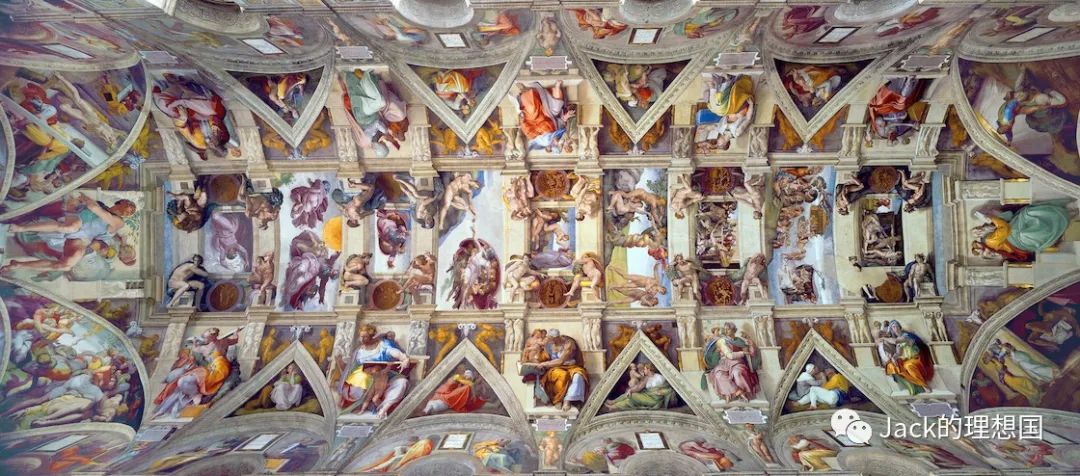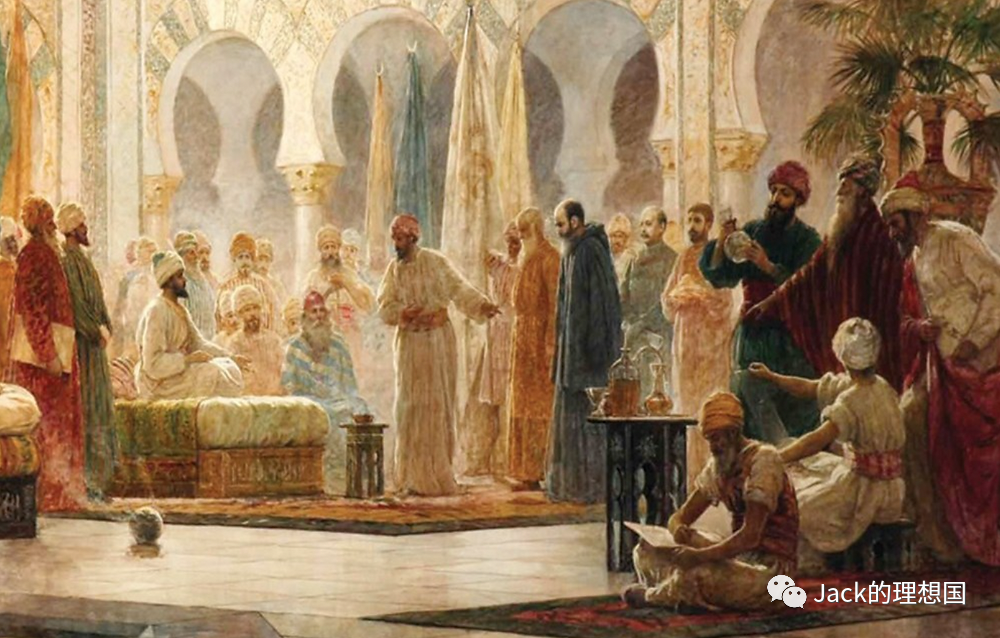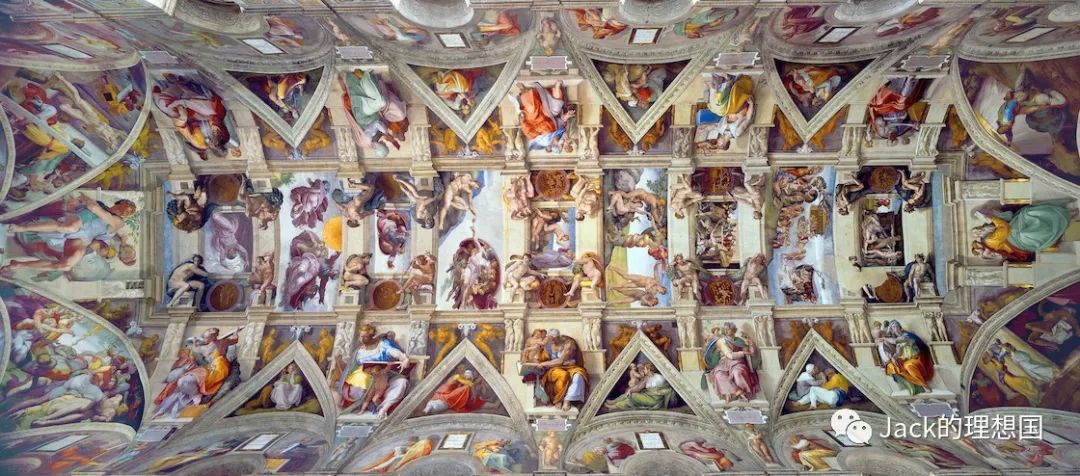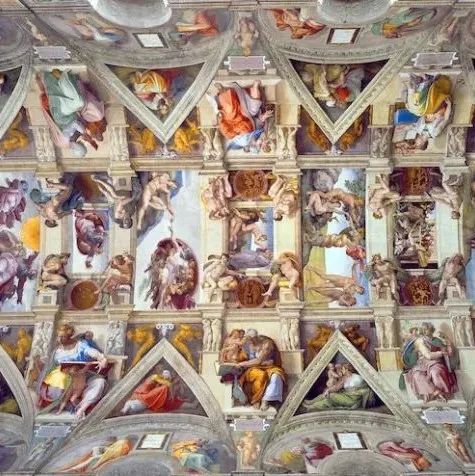Links Between East and West 16 Beliefs 东西方的连接16 - 信仰
Towards the end of The Game of Thrones television series, Tyrion Lannister gives a mini-speech in which he claims: “What unites people? Armies? Gold? Flags? Stories. There’s nothing in the world more powerful than a good story. Nothing can stop it. No enemy can defeat it.” This quote reiterates the power of stories that make up beliefs, one of humankind's most unique yet significant inventions. By “belief,” one should not simply think of religion, though religion is a type of belief. Belief means much more than religion, it means any collection of stories connecting a group of distinct individuals. This essay will examine some of the most renowned, mighty beliefs throughout history and in the modern world, then try to enunciate their impacts through analysis and comparison.
The Beliefs of God
The most fitting place to start this examination and analysis is to first look at a deity's religions (or deities). Their power to sustain cultures and unite people lies in establishing an idealistic image of a god and the constant provision of spiritual support to all believers. By providing the image and support, the population would possess common creeds to put faith in and common goals to strive for.

(Ceiling of the Sistine Chapel, painted by Michaelangelo)
Christianity is one of the oldest monotheistic religions globally and is still the most popular, with 2.5 billion believers worldwide. Throughout history, it has never been enough to stress the importance of Christianity to the founding and development of western culture. Socially, the Church has been a major source of social activities such as schooling or medical care, and it is also the place for social interactions on all levels to take place. Culturally, Christianity has been an inspiration for art, philosophy, and music. Stories from The Bible inspired great artworks such as The Pieta, the ceiling of the Sistine Chapel, The Last Dinner, and countless more. It inspired great philosophers or theorists, such as St. Augustine and St. Thomas Aquinas, and influential theories like natural or eternal law. It inspired musicians like Bach, Handel, and Mozart, to compose religious pieces that have withstood the test of time, to compose music beyond greatness. Politically, Christianity was an influential player, especially during the Middle Ages, when the Catholic Church held significant sway over political decisions. The Pope was almost, if not equally, as powerful as the monarch. Christianity, as a belief, is one of the cornerstones of western civilization, and it continues to bring influence on the globe today.
Christianity has had enormous impacts on the western world. In science, Christianity has boosted the rise of modern science by encouraging exploration into the natural world and posing concepts conducive to scientific inquiry, such as awareness of order, views of man as a superintendent of nature, and many others. Many of the world’s greatest scientists, including Newton, Kepler, and Pasteur, were Christians. In the field of society, Christianity has led social development in multiple ways, such as creating social reforms and fueling social regeneration. Christianity, additionally, caused literacy rates to increase and higher education to improve. More than 95% of all Puritans historically were literate, and 100 of the first 110 universities in America were founded to propagate the Christian religion. Similarly, without Jesus, there would have been no concert, no symphony, no concerto, no religious art, and no other forms of modern art in the arts realm.

Islam is a similar case. Islam, in history, was indispensable for the founding and consequential development of Middle Eastern culture. From the 9th to the 14th centuries, Islam's golden age brought in flourishes in art, mathematics, and science, and they have become attached to the Middle Eastern culture in countless ways. In many places across the Middle East, there was traditionally no separation of church and state, as seen predominantly in the west, a legacy of Islamic tradition. Many people in the Middle East generally agree that Islam should play a role in sharia law, governance, and everyday life, at least in the past. These are all evident impacts of Islam on Middle Eastern culture, politics, and daily life. Like Christianity, Islam is a belief that is essential for the foundation and historical progression of Middle Eastern culture and bonds together the Middle Eastern ethnicities.
Similarly, Islam has had a huge impact on the modern world. The Islamic culture contributed to the fields of mathematics, architecture, art, and philosophy in more ways than one can imagine. Many of the most basic mathematical rules that we take for granted originated from people who believed in Islam. Many of the most renowned architectural feats were born thanks to the design of Muslim architects. Some of the most prized art pieces, such as the Persian rug, were of Islamic origins.
The Beliefs of Nature
Similar to how the belief in God unites, if one goes far back in time, before the age of monotheistic religions, most people believed in things “simpler” and closer to mother nature that they were living by. Animism is a word that describes the belief that plants, objects, and other natural beings have a living soul. This belief, just like monotheism, defines and propels many native cultures that are still extant. Their power to glue together distinct individuals lies in the core of this belief itself, which is essentially connecting all to the common environment we share – nature.
For example, one of the native groups in Canada, the Ojibwe, has had an animistic belief that has been able to tie together their people and define their unique culture for centuries. Anthropologist Irving Hallowell observed, “personhood did not require human-likeness, but rather humans were perceived as being like other persons, who ... included rock persons and bear persons.” Perhaps it is exactly because this natural belief integrates people into the surrounding world seamlessly, that it gains the ability to create strong ties within the Ojibwe community or culture.
Although the belief in nature has the power to be the cornerstone of culture and the unifying force of individuals, it is dwindling in the modern world. I believe there are two rooted reasons.
First, the development of science and technology has increasingly pushed people to disregard natural powers. Looking at the timeline of history, the trend of belief has progressed from animism to polytheism and monotheism. This trend of belief does roughly, at least, match the trend of technological advancement. The age of animism roughly spanned when people lived in smaller clans and only discovered primitive agriculture means at the most. The age of polytheism roughly spanned from when the Agricultural Revolution picked up its pace right to the birth of Jesus. During this time, humans began to experiment with more artificial living and producing methods. The age of monotheism roughly spanned from the birth of Jesus to today. During this time, technological progression has completely taken off, especially since the Enlightenment and the Industrial Revolution. When people invent a new means to rely less on nature, the belief that makes sapiens just another species in the natural world turns less powerful.
Second, while the development of science and technology makes people digress from believing in natural powers, the development of economics and politics makes people believe more in the power of individuals. The rise of dominant central governments gradually persuaded or compelled many to abandon their beliefs in nature and turn to believe in these human governments or leaders. Along with the first reason, animism lost its capability to convince the populace to put their faith in and became only a uniting force in the distant past.
Looking at the belief system of nature, it has conveyed less fundamental but equally significant impacts on the modern world. When people believe in nature, they believe humans are just a part of nature and should respect the other natural elements, like animals, and plants, as equals. This belief influenced modern-day environmentalism, which holds the same slogans and ideas.
The Beliefs of People and History
The last major system of belief this essay will look into is the belief in people and history. This system is not as obvious as the last two, and its importance in binding together the people of a nation or culture is often overlooked. One of the places around the globe where people's beliefs and history have had their most significant influence is China.
Unlike many other regions, the majority of the Chinese people historically and today have not identified themselves as a part of a clear religion. True, Buddhism is a widespread religion in China, but its believers are relatively limited compared to the other main religions of the world. Then, the question necessarily becomes, what has been the holding force of the Chinese nation for thousands of years of history? What has kept the Chinese civilization and the Chinese culture continuous?
The first part of the answer to these two questions lies in the faith of the Chinese in their ethnicity and nationality, which are intertwined together. The Chinese, under most circumstances, have their belief in the ingenuity, problem-solving abilities, and the importance of their ethnicity. Throughout most segments of history, the Chinese, be it in war or peace, have believed in the whole of the nation. In the past, since Emperor Qin of the Qin Dynasty first unified China, China suffered through many regime changes. Yet most regimes, if not all, worked arduously to ensure the nation's unification. The reason for possessing this determination to retain unity stems from the belief that the Chinese have in their entire ethnicity, which creates a centripetal force compelling every leader to think along the lines of staying together rather than dividing apart. This unique belief in the people and the nation as a wholesome entity has bonded China together throughout much of its long history and defines its culture.
The second part of the answer lies in the faith of the Chinese in their history and historical-cultural values. Unlike The Bible or The Koran, the “Holy Scripture” for China is The Analects by Confucius and the other works belonging to the Confucian School. The books of the Confucian School explain how to be a good person and how to be a good citizen. “How to be a good citizen” includes codes in morality, social conduct, etc. The books try to nurture a gentle, compassionate, profound, and just Chinese. They truly provide an entire religion-like system for every Chinese to believe in. By following or believing in the codes, the country can be held together properly because each person has faith and attempts to become a “good citizen.” As the years passed, this belief in history became the most vital foundation block of Chinese civilization.
Conclusion
Overall, around the world and throughout history, different belief systems have appeared and created much impact on the advancement of the world. The power of beliefs, indeed, is a thought-provoking topic. Although beliefs have created so much wonder in our world, they have also brought unfathomable damage, with imprisonment of minds, blood-drenched religious warfare, and mind-disturbing theories of racial discrimination. Then, the real questions are how do we utilize beliefs for our good? How can we minimalize the damage of harmful beliefs? Is it even possible to completely take down beliefs? Those were the questions that our ancestors might ponder when the first beliefs appeared, and those are the questions that we still ponder today living on this volatile globe.
WORKS CITED
PICTURES CITED
https://www.theworldwithmnr.com/post/the-golden-age-of-islam
https://smarthistory.org/michelangelo-ceiling-of-the-sistine-chapel/
在《权力的游戏》的结尾,提利昂-兰尼斯特发表了一个小型演讲,他声称:"是什么让人们团结起来?军队?黄金?旗帜?是故事。世界上没有什么比一个好故事更有力量。没有什么能阻止它。没有敌人能打败它"。这句话重申了构成信仰的故事的力量,它是人类最独特而又最重要的发明之一。说到 "信仰",人们不应简单地想到宗教,尽管宗教是信仰的一种。信仰的含义远远超过宗教,它意味着任何可以连接一群不同个体的故事集合。这篇文章将尝试考察历史及现代社会一些最著名、最强大的信仰,并通过比较与分析以阐述它们的影响。
信仰之上帝
神灵的宗教是这次考察与分析最好的起点。它们维系文化和团结人民的力量在于建立一个理想化的神的形象,并不断向所有信徒提供精神支持。通过提供形象和支持,人们将拥有共同的信条来信仰,拥有共同的目标来奋斗。

(西斯廷教堂的穹顶)
基督教是世界上最古老的一神教之一,至今仍是最受欢迎的宗教,全世界有25亿信徒。纵观历史,对于基督教对西方文化建立和发展重要性的强调是永远不够的。在社会上,教会一直是学校教育或医疗等社会活动的主要支持来源,它也是各个层面的社会互动的场所。在文化上,基督教一直是艺术、哲学和音乐的灵感来源。《圣经》中的故事激发了诸如圣母怜子像、西斯廷教堂的天花板、《最后的晚餐》等伟大的艺术作品。它启发了伟大的哲学家和理论家,如圣奥古斯丁和圣托马斯-阿奎那,以及像自然法或永恒法这样有影响力的理论。它启发了音乐家,如巴赫、亨德尔、莫扎特等创作出经得起时间考验的宗教作品,创作出超越伟大的音乐。在政治上,基督教是一个有影响力的角色,特别是在中世纪,当时天主教会对政治决策有很大的影响力。教皇的权力几乎与君主一样,不相上下。基督教作为一种信仰,是西方文明的基石之一。
作为西方文明和文化基石的宗教,基督教对西方世界产生了巨大影响。在科学领域,基督教通过鼓励对自然界的探索和提出有利于科学探索的概念,如对秩序的认识、将人视为自然界的管理者等,推动了现代科学的崛起。世界上许多最伟大的科学家,包括牛顿、开普勒、巴斯德,实际上都是基督教徒。在社会领域,基督教以多种方式引领社会发展,如创造社会改革和推动社会再生。此外,基督教还使识字率提高,高等教育得到改善。事实上,历史上95%以上的清教徒都是识字的,美国最早的110所大学中有100所是为了宣传基督教的明确目的而建立的。同样,在艺术领域,如果没有耶稣,就没有音乐会,没有交响乐,没有协奏曲,没有宗教绘画,也没有其他形式的现代艺术。

伊斯兰教也是一个类似的情况。在历史上,伊斯兰教对于中东文化的建立和相应的发展是不可或缺的。伊斯兰教从9世纪到14世纪的黄金时代带来了艺术、数学、科学等方面的繁荣,它们以无数的方式扎根于中东文化。在整个中东地区的许多地方,传统上没有政教分离,不像在西方政教分离社会一般,这是伊斯兰传统的遗产。中东地区的许多人普遍认为,至少在过去,伊斯兰教应该在伊斯兰教法、治理和日常生活中发挥作用。这些都是伊斯兰教在中东文化、政治和日常生活中的明显影响。伊斯兰教和基督教一样,是中东文化的基础和历史进步的重要信仰,并将中东各民族联系在一起。
同样,伊斯兰教也对现代世界产生了巨大影响。伊斯兰文化在数学、建筑、艺术和哲学领域的贡献超出人们的想象。许多我们认为理所当然的最基本的数学规则,都源于对伊斯兰教有坚定信仰的人。许多最著名的建筑壮举都是由于穆斯林建筑师的设计而诞生的。一些最珍贵的艺术品,如波斯地毯,都是源于伊斯兰。
信仰之自然
与对上帝的信仰相类似,如果追溯到一神教时代之前,世界上大多数人都有对 "更简单 "的事物的信仰,并且更接近于他们所生活的自然母亲。万物有灵论是一个描述植物、物体和其他自然生物有一个活的灵魂的信仰。这种信仰,就像一神教一样,定义并推动了许多仍然存在的本土文化。我认为,他们将不同的个体粘合在一起的力量在于这种信仰本身的核心,即从本质上将所有人与我们共同的环境--大自然联系起来。
举个例子,加拿大的一个土著群体,奥吉布韦人,有一种万物有灵的信仰,能够把他们的人民联系在一起,并在几个世纪以来定义他们的独特文化。人类学家欧文-哈洛韦尔指出,在他们的信仰中,"人的身份并不要求与人相似,而是认为人与其他的“人”一样,例如包括岩石人和熊人"。也许正是因为这种自然信仰将人与周围的世界完美地融合在一起,它才获得了在奥吉布韦社区或文化中建立强大联系的能力。
尽管自然信仰有能力成为文化的基石和个人的统一力量,但它在现代世界中正在逐渐减少。我认为有两个根源性的原因。首先,科学技术的发展越来越促使人们无视自然力量。纵观历史的时间轴,信仰的趋势从万物有灵论,到多神论,再到一神论。这种信仰的趋势至少与技术进步的趋势大致相符。万物有灵论的时代大约跨越了人们生活在较小的部族中,最多发生在原始农耕作业时期。多神教的时代大约从农业革命的步伐加快到耶稣的诞生。在这一时期,人类开始尝试更多的人工生活和生产方式。一神教的时代大约从耶稣诞生到今天。在这段时间里,技术进步完全起飞,特别是自启蒙运动和工业革命以来。当人们发明了一种新的手段来减少对自然的依赖时,把智人看待成自然界中的一个微小物种的信念就变得不那么强大了。
第二,虽然科学和技术的发展使人们偏离了对自然力量的信仰,但经济和政治的发展使人们更加相信人类的力量。能够在人们日常生活中占据主导地位的中央政府的崛起,逐渐说服或迫使许多人放弃对自然的信仰,转而相信这些人类政府或领导人。伴随着第一个原因,信奉自然力量的信仰失去了说服民众的能力,只在遥远的过去成为一种团结的力量。
纵观自然界的信仰体系,它向现代世界传达了不太根本但同样重要的影响。当人们相信自然时,他们认为人类只是自然的一部分,应该平等地尊重其他自然元素,如动物、植物。这种信仰影响了现代的环保主义,它持有同样的口号和同样的想法。
信仰之人与历史
本文要研究的最后一个主要信仰体系是对人和历史的信仰。这个系统不像前两个系统那么明显,事实上,它在将一个国家或文化的人民结合在一起方面的重要性经常被忽视。在全球范围内,对人和历史的信仰影响最大的地方之一是中国。
与许多其他地区不同的是,大多数中国人在历史上和今天都不认为自己是某个明确宗教的一部分。诚然,佛教在中国是一种普遍的宗教,但与世界上其他主要宗教相比,其信徒相对有限。那么,问题必然变成,在几千年的历史中,是什么力量支撑着中华民族?是什么让中华文明和中国文化得以延续?
这两个问题的第一部分答案在于中国人对其民族和国家的信仰,这两者是交织在一起的。在大多数情况下,中国人相信他们的聪明才智、解决问题的能力和他们民族生存的重要性。中国人在历史的大部分环节中,无论是战争还是和平时期,都相信整个民族的力量。在过去,自从秦始皇首次统一中国以来,中国经历了许多政权的更迭。然而,大多数政权,如果不是全部,都为确保国家的统一作出了艰苦的努力。之所以拥有这种保持统一的决心,是因为中国人对其整个民族的信念创造了一种向心力,迫使每个领导人沿着保持团结而不是分裂的方向思考。这种对人民和国家的独特信念,作为一个强壮的实体,在中国漫长的历史中把中国每个板块联系在一起,并确定了其文化特征与内涵。
答案的第二部分在于中国人对其历史和历史文化价值的信仰。与《圣经》或《古兰经》不同,中国的 "圣经 "是孔子的《论语》和属于儒家学派的其他作品。儒家学派的书籍不仅解释了如何成为一个好人,而且还解释了如何成为一个好公民。"如何成为一个好公民 "包括道德、社会行为等方面的准则。这些书试图培养一个温和的、有同情心的、深刻的、公正的中国人。他们真正为每一个中国人提供了一个类似于宗教的系统,让他们相信,通过遵循或相信这些准则,国家可以被正确地粘合在一起,因为每个人都有信心,并试图成为一个 "好公民"。随着时间的推移,这种对历史的信仰变成了中国文明最重要的基石。
结论
总的来说,在世界各地和整个历史中,不同的信仰体系已经出现,并对世界的进步产生了很大的影响。信仰的力量,确实是一个发人深省的话题。尽管信仰在我们的世界中创造了许多奇迹,但也带来了不可估量的伤害,如对人民思想的禁锢、充满血腥的宗教战争、令人发止的种族歧视理论。那么,真正的问题是我们如何正确地利用信仰,为人类社会进步做出积极贡献?我们怎样才能将有害信仰的伤害降到最低?最终,从最基本的层面出发,人有可能完全打倒人创造的信仰吗?这些都是我们的祖先在第一批信仰出现时可能会思考的问题,也仍然在今天是我们生活在这个动荡的星球上会思考的问题。
- 本文标签: 原创
- 本文链接: http://www.jack-utopia.cn//article/408
- 版权声明: 本文由Jack原创发布,转载请遵循《署名-非商业性使用-相同方式共享 4.0 国际 (CC BY-NC-SA 4.0)》许可协议授权










